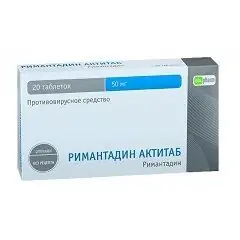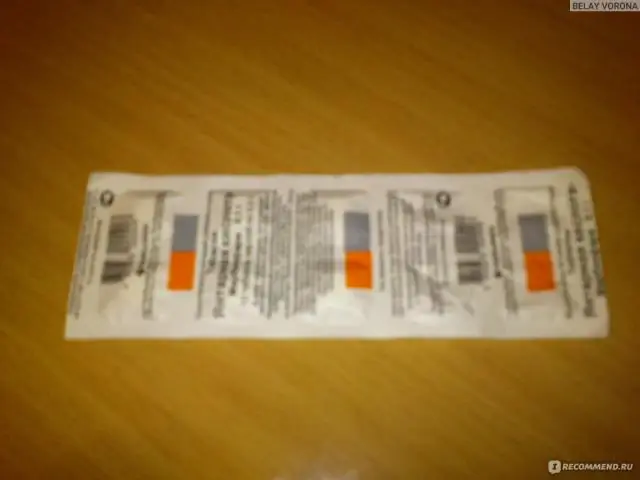- Author Rachel Wainwright wainwright@abchealthonline.com.
- Public 2023-12-15 07:39.
- Last modified 2025-11-02 20:14.
Rimantadine Aktitab
Rimantadin Aktitab: instructions for use and reviews
- 1. Release form and composition
- 2. Pharmacological properties
- 3. Indications for use
- 4. Contraindications
- 5. Method of application and dosage
- 6. Side effects
- 7. Overdose
- 8. Special instructions
- 9. Application during pregnancy and lactation
- 10. Use in childhood
- 11. In case of impaired renal function
- 12. For violations of liver function
- 13. Use in the elderly
- 14. Drug interactions
- 15. Analogs
- 16. Terms and conditions of storage
- 17. Terms of dispensing from pharmacies
- 18. Reviews
- 19. Price in pharmacies
Latin name: Rimantadine Actitab
ATX code: J05AC02
Active ingredient: rimantadine (rimantadine)
Producer: Obolensk pharmaceutical company CJSC (Russia)
Description and photo updated: 2018-23-11
Prices in pharmacies: from 83 rubles.
Buy

Rimantadine Actitab is an antiviral drug.
Release form and composition
Rimantadine Aktitab is available in the form of tablets: white, flat-cylindrical, with a bevel (10 or 20 pcs. In blisters, in a cardboard box 1 or 2 packages).
1 tablet contains:
- active substance: rimantadine hydrochloride - 50 mg;
- auxiliary components: lactose (milk sugar), potato starch, calcium stearate, talc.
Pharmacological properties
Pharmacodynamics
Rimantadine Actitab is an antiviral drug with antitoxic and immunomodulatory effects. Rimantadine is an adamantane derivative that is active against influenza A virus strains, tick-borne encephalitis viruses of the Flaviviridae family (Central European and Russian spring-summer group of arboviruses), Herpes simplex viruses (types I and II). The polymer structure of rimantadine allows it to circulate for a long time in the body, providing not only a therapeutic effect, but also a preventive effect. Being an insoluble base, it increases the acidity (pH) of endosomes with a membrane of vacuoles that surround viral particles entering the cell. As a result of the prevention of acidification in these vacuoles, the fusion of the viral envelope with the endosome membrane and the transfer of the genetic material of the virus into the cytoplasm of the cell are blocked. Besides,rimantadine inhibits the release of viral particles from the cell, which leads to the interruption of the transcription of the viral genome. The prophylactic use of 200 mg of rimantadine per day reduces the risk of influenza infection, and in the case of influenza, reduces the severity of symptoms and serological reactions. A slight therapeutic effect of the drug may appear if it is started within the first 18 hours after the onset of flu symptoms.if you start taking it within the first 18 hours after the onset of flu symptoms.if you start taking it within the first 18 hours after the onset of flu symptoms.
The clinical efficacy of rimantadine is higher than that of amantadine, and its toxicity is lower.
Pharmacokinetics
After oral administration, rimantadine is absorbed slowly and almost completely in the intestine. The maximum concentration of rimantadine in blood plasma is reached after 1-4 hours and is, when taken per day, a dose of 100 mg: single - 181 ng / ml; twice - 416 ng / ml. The level of its concentration in the nasal secretion is 50% higher than in the blood plasma.
Plasma protein binding - approximately 40% of the dose taken. The volume of distribution in adults is 17-25 l / kg, in children - 289 liters. Rimantadine is metabolized in the liver.
T 1/2 (half-life) in children 4-8 years old - 13-38 hours, in patients aged 20-44 years - 25-30 hours, in elderly patients 71-79 years old and with chronic liver failure - about 32 hours … More than 90% of the drug is excreted through the kidneys within 72 hours, mainly in the form of metabolites; up to 15% are excreted unchanged.
T 1/2 in chronic renal failure doubles. In elderly patients with renal insufficiency, the drug can accumulate to toxic concentrations, therefore, for this category of patients, the dose should be adjusted in proportion to the decrease in creatinine clearance (CC). Hemodialysis has no significant effect on the clearance of rimantadine.
Indications for use
- prevention and early treatment of influenza A in patients over 7 years of age;
- prevention of influenza in adults during an epidemic;
- prevention of tick-borne encephalitis of viral genesis.
Contraindications
- chronic and acute kidney disease;
- thyrotoxicosis;
- acute liver disease;
- period of pregnancy;
- breast-feeding;
- age up to 7 years;
- individual intolerance to the components of the drug.
According to the instructions, Rimantadine Actitab should be used with caution in arterial hypertension, atherosclerosis of the cerebral vessels, epilepsy (including history), hepatic failure, chronic renal failure.
Instructions for the use of Rimantadine Aktitab: method and dosage
Rimantadin Actitab tablets are taken orally, after meals, with plenty of water.
Recommended dosage for influenza A treatment based on age:
- adults: on the 1st day - 100 mg 3 times or 300 mg once; on the 2nd and 3rd day - 100 mg 2 times; on the 4th day - 100 mg once;
- children aged 7-10 years: 50 mg 2 times a day;
- adolescents 11-14 years old: 50 mg 3 times a day.
To achieve a therapeutic effect, the administration of Rimantadine Actitab should be started within the first two days after the onset of symptoms of influenza A. The duration of the course is 5-7 days.
Influenza prophylaxis in adults should be carried out at a dose of 50 mg once a day. The duration of the course is 10-15 days.
In chronic renal failure with CC less than 10 ml / min, severe hepatic insufficiency and in old age, the daily dose of the drug for the treatment of influenza is 100 mg.
Side effects
Usually rimantadine is well tolerated without causing side effects, but in some cases the following reactions from systems and organs are possible:
- from the central nervous system: drowsiness, fatigue, headache, insomnia, dizziness, increased excitability, anxiety, neurological reactions, impaired concentration;
- from the gastrointestinal tract: dry mouth, flatulence, epigastric pain, nausea, vomiting, anorexia;
- others: itchy skin, rash, urticaria and other manifestations of allergic reactions, hyperbilirubinemia.
Overdose
Overdose symptoms have not been established.
special instructions
There is a risk of developing Rimantadine-resistant Actitab viruses.
The use of the drug for the type B influenza virus has an antitoxic effect.
The action of the drug can exacerbate chronic diseases. In elderly patients with arterial hypertension, hemorrhagic stroke may develop. With concomitant anticonvulsant therapy, patients with epilepsy are advised to use no more than 100 mg of rimantadine per day, since the risk of epileptic seizures increases against the background of a combination of drugs.
After contact with those infected with influenza during an epidemic or with an infection spreading in closed groups, taking Rimantadine Actitab for 10 days is an effective prevention of infection.
Influence on the ability to drive vehicles and complex mechanisms
During the period of taking the drug, it is recommended to be careful when performing work that requires an increased speed of psychomotor reactions and concentration of attention, including driving.
Application during pregnancy and lactation
The use of Rimantadine Aktitab is contraindicated during gestation and during breastfeeding.
Pediatric use
Rimantadine is contraindicated in children under the age of 7 years.
With impaired renal function
It is contraindicated to take the tablets in patients with acute or chronic forms of kidney disease.
Rimantadine Actitab should be used with caution in chronic renal failure. For the treatment of influenza in patients with chronic renal failure (CC less than 10 ml / min), the dose of the drug should not exceed 100 mg per day.
For violations of liver function
Do not take Rimantadine Actitab tablets for acute liver disease.
Use with caution in liver failure. With severe hepatic impairment, the daily dose of the drug for the treatment of influenza should be 100 mg.
Use in the elderly
Rimantadin Actitab should be used with caution in old age. The daily dose for the treatment of influenza is 100 mg.
Drug interactions
With the simultaneous use of Rimantadine Aktitab:
- antiepileptic drugs: rimantadine reduces their therapeutic effect;
- adsorbents, coating and astringent agents: help to reduce the absorption of rimantadine;
- ascorbic acid, ammonium chloride and other urine acidifying agents: cause a faster excretion of rimantadine by the kidneys, reducing its effectiveness;
- sodium bicarbonate, diacarb and other urine alkalizing agents: enhance the action of rimantadine, reducing its excretion;
- cimetidine: decreases drug clearance by 18%;
- acetylsalicylic acid, paracetamol: by 10 and 11%, respectively, reduce the maximum concentration of rimantadine in the blood plasma.
Analogs
Analogs of Rimantadine Aktitab are: Rimantadin, Remavir, Kagocel, Remantadin Sti, Algirem, Arbidol, Orvirem, Olvirem, Tamiflu, Polirem.
Terms and conditions of storage
Keep out of the reach of children.
Store at temperatures up to 25 ° C in a dark place.
The shelf life is 5 years.
Terms of dispensing from pharmacies
Available without a prescription.
Reviews of Rimantadine Aktitab
Reviews of Rimantadine Aktitab are mostly positive. Patients report the drug's effectiveness and faster recovery when treating influenza. They also note the need for earlier use of the drug, immediately after the first symptoms of the disease appear. In some cases, this allows you to stop the development of the flu, but more often - to reduce the risk of its complications. With the onset of cold weather, many take pills as a preventive measure. The advantages of the drug include its rather low cost, in comparison with other antiviral agents.
Price for Rimantadin Aktitab in pharmacies
The price of Rimantadin Aktitab for a pack containing 20 tablets can range from 70 to 90 rubles.
Rimantadin Aktitab: prices in online pharmacies
|
Drug name Price Pharmacy |
|
Rimantadin Actitab 50 mg tablets 20 pcs. 83 rbl. Buy |
|
Rimantadin Actitab tablets 50mg 20 pcs. RUB 99 Buy |

Anna Kozlova Medical journalist About the author
Education: Rostov State Medical University, specialty "General Medicine".
Information about the drug is generalized, provided for informational purposes only and does not replace the official instructions. Self-medication is hazardous to health!






